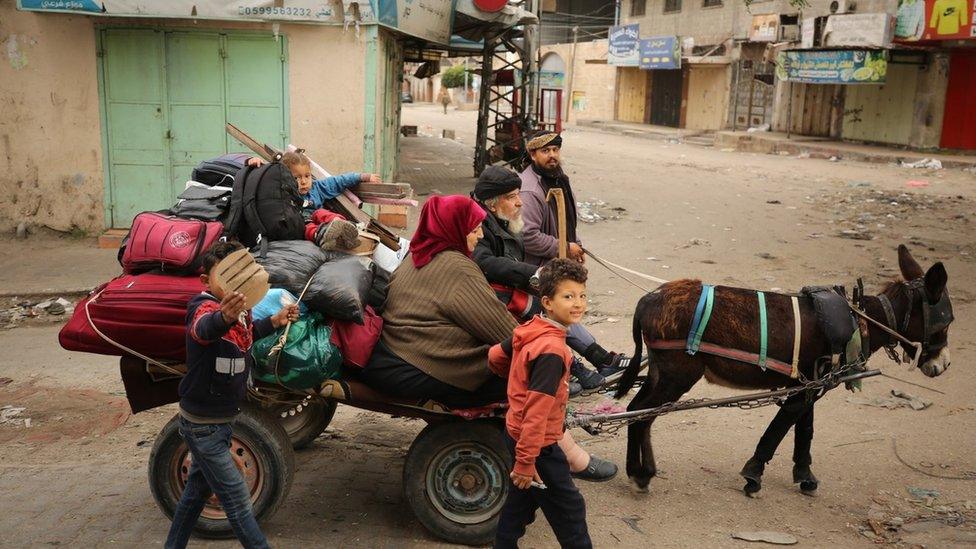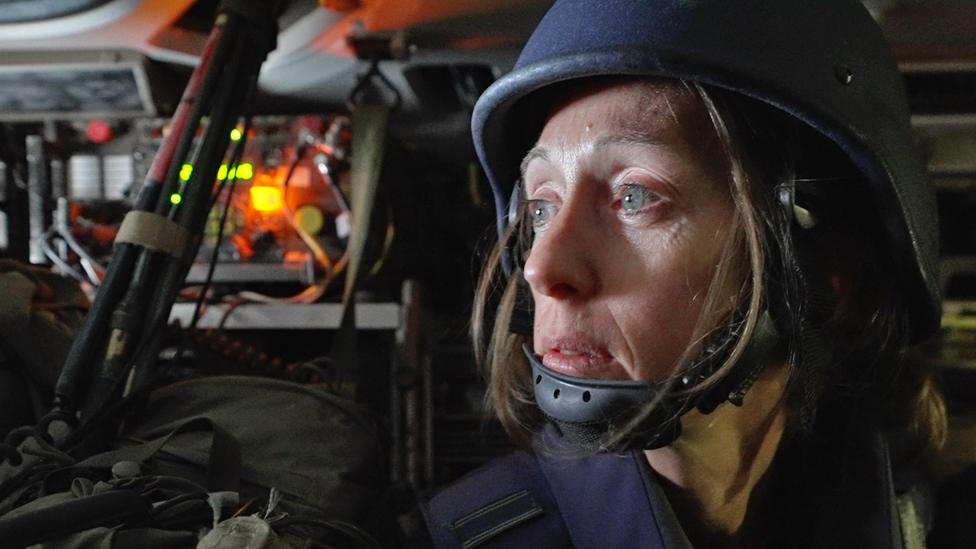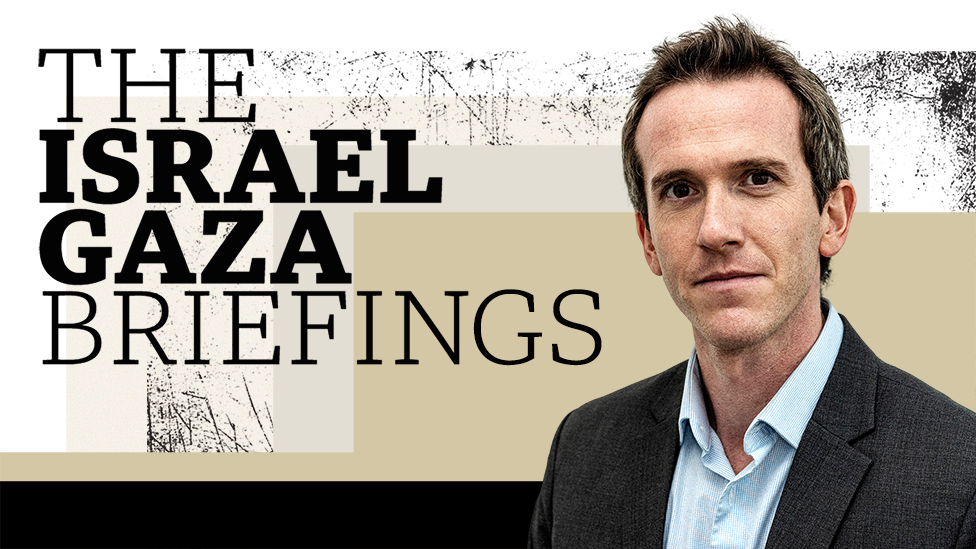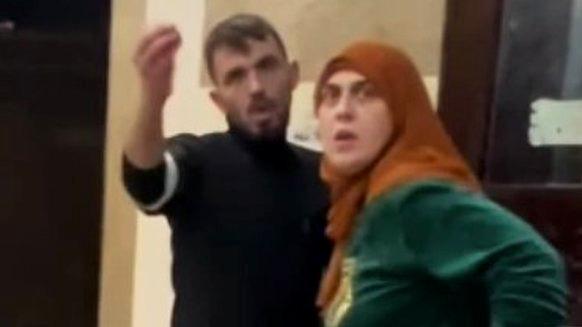Israeli forces raid Gaza City's al-Shifa hospital
- Published
Watch: Displaced Gazans describe al-Shifa raid
The Israeli military says it has taken control of al-Shifa hospital in Gaza City in what it called an operation to "thwart terrorist activity".
It said troops killed 20 "terrorists", including a senior commander of Hamas's internal security force, and detained dozens of suspects during the raid.
Witnesses described heavy exchanges of fire around the site, where thousands of displaced people are sheltering.
Gaza's Hamas-run health ministry said Israel was committing a war crime.
The Israeli military said there was no obligation for medical staff or patients to leave, and that the hospital could continue its important functions.
But several medical staff inside the hospital told the BBC that the electricity had been cut and that they had been instructed by the Israeli military not to move, prohibiting them from properly treating patients.
"We are trapped where we are inside the department," said Dr Amer Jedbeh, a 31-year-old surgical resident.
"A shell hit our building on the first floor, injuring several people. One man died - we could not save him. We are working only with first aid, essentially, we cannot operate because there is no electricity or water."
Dr Jedbeh said two patients on life support at the intensive care unit in the same building had died because the electricity supply was cut ahead of the raid. "All the machinery is off," he added.
"Colleagues from the main building say there are many injured there who need surgery but we cannot get to them and they cannot bring the patients to us."
The military has told civilians living in the surrounding area that they should leave immediately for the own safety and head south the "humanitarian area" in al-Mawasi, near the southern city of Rafah.
Israeli forces have been fiercely criticised for their previous raids on Gaza's health facilities - including al-Shifa - during the five-month war with Hamas.
The conflict began after Hamas gunmen killed about 1,200 people in southern Israel on 7 October and took 253 other people hostage.
More than 31,700 people have been killed in Gaza since then, including 81 people in the past 24 hours, according to the territory's health ministry.

Eyewitnesses to the latest raid on al-Shifa described a state of panic inside the hospital - Gaza's biggest medical facility - as Israeli troops launched the rapid and unexpected raid in the early hours of Monday morning.
"Tanks are surrounding us. We are hiding inside the tent. We hear tank fire in the vicinity of the compound," Mahmoud al-Saudi said in a recorded call with his brother, which was posted on a WhatsApp group.
Another man inside the hospital, Mohammed al-Sayyid, said in a voice message sent to journalists: "The soldiers here inside the complex, there are dead and wounded, and the soldiers arrested some young men."
The deputy director of the emergency department at al-Shifa told the BBC that there were about 20 doctors and 60 nurses inside the hospital, as well as hundreds of patients.
Dr Amjad Eliwah - who is just outside the hospital grounds but is in contact with his staff inside - described the situation as "very critical".
He also said the Israeli troops raided two schools next to the hospital that were being used as shelters by displaced people.
They arrested all the men inside and told the women to leave through a designated exit and head south towards the town of Deir al-Balah, he added.
Israel Defense Forces (IDF) chief spokesman Rear Admiral Daniel Hagari announced overnight that troops were conducting a "high-precision operation in limited areas of al-Shifa hospital following concrete intelligence that demanded immediate action".
"We know that senior Hamas terrorists have regrouped inside al-Shifa hospital and are using it to command attacks against Israel," he said.
He added: "We call upon all Hamas terrorists hiding in hospitals to surrender immediately. Medical facilities should never be exploited for terror. Hamas must be held accountable."
Hamas and health officials have repeatedly denied the accusation that Hamas fighters have operated inside or underneath al-Shifa and other hospitals.
Later on Monday, the IDF said in a statement that troops had "identified terrorist fire toward them from a number of hospital buildings", adding: "The forces engaged the terrorists and identified several hits."
It also released grainy night-time video footage from drones and an armoured vehicle that it said showed troops coming under fire from within the compound and the detonation of an explosive device.
In the afternoon, the IDF announced: "Twenty terrorists have been eliminated at al-Shifa hospital thus far in various engagements, and dozens of apprehended suspects are currently in questioning."
It said among those killed was the head of the operations directorate of Hamas' internal security service, Faiq al-Mabhouh, adding that he had been "hiding in a compound... from which he operated and advanced terrorist activity".
The Hamas-run government's media office said Faiq al-Mabhouh had been in charge of co-ordinating deliveries to northern Gaza with local clans and the UN.
Qatar-based broadcaster Al Jazeera meanwhile reported that Israeli forces had beaten and arrested its correspondent Ismail al-Ghoul during the raid. There was no immediate comment from the IDF.
The IDF also said an Israeli soldier, Staff Sgt Matan Vingradov, had been killed in northern Gaza on Monday, but did not say whether it happened at al-Shifa.

The Israeli military told Palestinians living in the area surrounding al-Shifa hospital to leave and head south
The Hamas-run health ministry said in a statement that Israeli forces had "invaded" al-Shifa Hospital for the fourth time since start of the war and was using "fabricated narratives" to justify its actions.
It accused the troops of "directly shooting the specialised surgeries building with bullets and targeting it with missiles", and said a number of people had been killed and wounded.
"The presence of Israeli vehicles in the courtyards of the complex in a real tragedy and an attack on health institutions against all international laws and norms," it added.
Hamas also denounced what it called a "new crime" by Israeli forces.
The director-general of the World Health Organization (WHO) said he was "terribly worried about the situation" at al-Shifa hospital, which he warned was "endangering health workers, patients and civilians".
"The hospital has only recently restored minimal health services. Any hostilities or militarization of the facility jeopardize health services, access for ambulances, and delivery of life-saving supplies," he wrote on X, formerly known as Twitter. "Hospitals must be protected. Ceasefire!"
Hospitals have protected status during times of war under international humanitarian law - but they can lose that protection in limited circumstances if they are being used to commit an "act harmful to the enemy".
The UN says only 12 of Gaza's 33 hospitals are partially functioning - six of them are in the north, including al-Shifa, and six in the south.
Staff at al-Shifa were already in a "terrible condition" before the last raid, according to the hospital's director of emergency medicine.
Dr Mutaz Harara told the BBC over the weekend that medical staff were "completely exhausted" and treating dozens of patients every day suffering from malnutrition, dehydration and various injuries.
The UN warned on Monday that famine was "imminent" in northern Gaza, with an estimated 70% of the 300,000 people living there experiencing catastrophic levels of hunger,
The IDF said it found tunnels used by Hamas underneath al-Shifa when it carried out an extensive operation in November, searching for evidence of what it said was a key "command and control centre" for the group.
Israeli troops also carried out a major operation at Nasser hospital - Gaza's second biggest - in the southern city of Khan Younis in February.
Doctors told the BBC they were detained, blindfolded and beaten during the raid - reports which prompted the UK to call for "answers from the Israelis".
The IDF said it found weapons and medication intended for hostages at Nasser hospital. Several released hostages have also said they were held there.
Additional reporting by Rushdi Abualouf in Istanbul and Sean Seddon in London
Related topics
- Published16 November 2023

- Published16 March 2024

- Published14 March 2024
